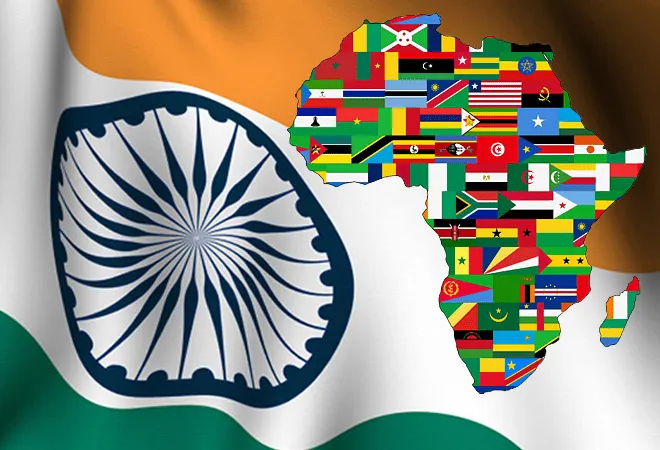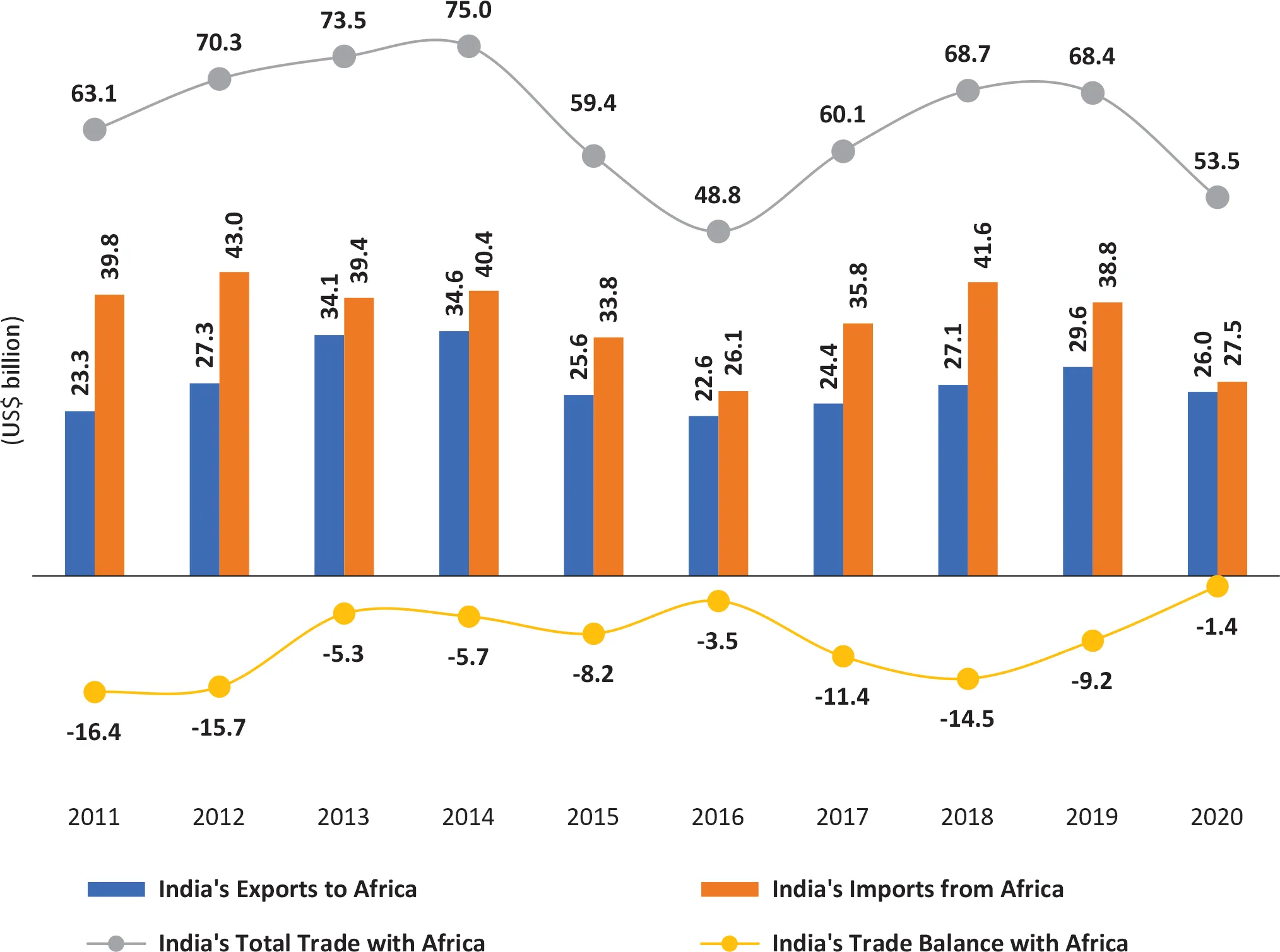
Civilisational and historical links, political and emotional anti-colonial solidarity, diasporic goodwill, and an embedded feeling of a true ‘South-South’ collaboration—these are some of the adages commonly used to cherish and define the past, present, and future of the partnership between India and the African continent. From the days of common struggle against colonialism to an evolving and multifaceted 21
st century partnership under the framework of South-South Cooperation, the Africa-India partnership has come a long way.
Policy priorities and needs of Africans have received the Government of India’s consideration in the most consistent manner. The diverse set of engagements in education, healthcare, agriculture, defence and security, science and technology, capacity building, and infrastructure which India has laid down for the interested and willing countries from Africa is much appreciated by the recipients. The COVID-19 pandemic also strengthened the existing developmental partnership, guided by the ‘
Kampala Principles’—a set of 10 principles enunciated by Prime Minister Narendra Modi in 2019 during his address to the Ugandan Parliament.
The diverse set of engagements in education, healthcare, agriculture, defence and security, science and technology, capacity building, and infrastructure which India has laid down for the interested and willing countries from Africa is much appreciated by the recipients.
These principles essentially outline the Indian approach towards development cooperation with African countries. What the
Indian model offers to African countries is a unique blend of developmental package, technology transfers and skill, and infrastructure development which are in accordance with African needs and priorities and is non-conditional, unlike China or some western donors.
Even during the COVID-19 pandemic, India stood in solidarity with Africa. Both the sides worked closely to ensure that repatriation of each other’s nationals, through the arrangement of special flights, was carried out smoothly. Moreover, despite severe shortages at home, India tried its best to provide vaccination doses to the African countries to the extent possible. This included medical assistance worth US$5 million to 25 African countries, and
39.65 million doses of ‘Made in India’ Covid vaccines to 42 African countries.
This is the context in which the 17
th edition of the Confederation of Indian Industries (CII) and Export Import (EXIM) Bank Conclave on India-Africa Growth Partnership took place on 19-20 July 2022. Over 1000 representatives from governments and businesses from various African countries attended the conclave.
Growing Trade and Investment
India’s External Affairs Minister, Dr. S Jaishankar, while giving his special address,
highlighted that India’s bilateral trade with Africa “has now reached US$ 89.5 billion in 2021-2022 compared with US$ 56 billion the previous year.” Today, India’s exports to Africa accounts for a healthy 5.2 percent of Africa’s global imports, whereas India’s imports accounted for 7 percent in the continent’s global exports in 2020. This shows that India is Africa’s fourth-largest trading partner.
South Africa, Nigeria, Egypt, Kenya, Mozambique, and Tanzania are the leading destinations for India’s export to Africa. Petroleum products are the largest items in India’s export basket, followed by pharmaceutical products, vehicles, and cereals.
On the other hand, India’s major import sources from the continent are South Africa, Nigeria, Angola, Egypt, and Morocco with mineral fuels, oil (mainly crude), natural or cultured pearls, precious or semi-precious stones, and inorganic chemicals being the major imported items by India from Africa.
India’s trade with Africa
 Source: EXIM Bank “Building a Resilient Africa: Enhanced Role for India”, Working Paper No: 110
Source: EXIM Bank “Building a Resilient Africa: Enhanced Role for India”, Working Paper No: 110
The investment aspect of the relationship is also progressing well, ning across greenfield and brownfield sector. Cumulative Indian investments in Africa during the period of April 1996 to March 2022
amounted to US$73.9 billion with Mauritius, Mozambique, Sudan, Egypt, and South Africa being the top destinations of India’s investments. This makes India one of the top five investors in the continent.
Innovative Financing and Integration into Global Value Chains
Indian private companies are increasingly exploring innovative ways of financing like blended finance, Public Private Partnership, pension funds, among others. The longstanding aim to export Indian innovations in Information Technology, digital technology, and knowledge and skills transfer, through Indian private sector has received a major push in recent years.
The extension of Government of India supported Lines of Credit (LOC) on concessional terms continues to remain a popular instrument for undertaking various development projects. As of March 2022, a total of 204 LOCs to the tune of
US$12.37 billion have been extended by India to 42 African countries. However, newer forms of financing like EXIM Bank’s newly launched
Trade Assistance Programme—under which Indian banks that are engaged in international trade would be supported by the EXIM Bank with transaction-specific partial or full guarantees to cover payment risks on banks in least developed/developing countries—would enable in building trust between counterparties towards settlement of trade transactions globally and expand correspondent banking relationships. A total of 26 African countries have been identified initially that could seek risk mitigation support under this initiative.
The idea is to take the manufacturing base closer to the African markets and come up with sub-regional and targeted strategies in order to create products to serve local needs and generate employment.
The challenge and opportunity for Indian companies is to find ways to create and add value to products. Value addition would integrate Africa to the global value chain (GVC) and would give the continent that added edge. The idea is to take the manufacturing base closer to the African markets and come up with sub-regional and targeted strategies in order to create products to serve local needs and generate employment.
If India is to enhance its trade and investment relations with Africa, it would need to pursue an integrated approach comprising, inter alia, integrating Africa to the GVCs, strengthening Africa’s infrastructure and connectivity, and facilitating trade finance in Africa.
The Triad of Health, Digital and Green Growth
Dr S Jaishankar also pointed out that health, digital, and green growth are the sectors where India and Africa are currently emphasising their partnership.
Public health security is a domestic priority for India and African countries and the pandemic has certainly exposed the fragility of healthcare systems across the two regions. Some conservative estimates indicate Africa’s health financing gap to be around
US$66 billion per annum. However, India's commitment to universal access to good quality healthcare has been factored into the India-Africa development partnership, especially in those areas where Indian experiences and remedies could be suitably adapted to African healthcare needs. Various opportunities exist for the Indian private sector to invest in development of secondary and tertiary hospitals and labs. The African pharmaceuticals industry is still at an infant nascent stage and this provides huge opportunities for the Indian pharmaceuticals industry that is capable of providing generic medicines at affordable prices. Towards this end, the
US$10 million India-Africa Health Fund, that was announced at the third India-Africa Forum Summit (IAFS) in 2015, needs to be better utilised. India can help set up tertiary hospitals across the continent after consulting the African Union to identify the numbers and locations of these hospitals. This would help to foster local ownership and ensure a wide buy-in from the beneficiary country.
The African pharmaceuticals industry is still at an infant nascent stage and this provides huge opportunities for the Indian pharmaceuticals industry that is capable of providing generic medicines at affordable prices.
The last decade has witnessed a surge in digital innovations and mobile phone ownership across developing nations, particularly in India and sub-Saharan African countries. But as an entire continent, Africa continues to trail other regions of the world in terms of digital penetration, usage, and capabilities. Africa’s digital infrastructure is still lingering in its early growth stages, but there is immense potential to unify the continent through digital and emerging technologies. India has launched unique digital initiatives aimed at digital transformation like Digital India, BharatNet, Pradhan Mantri Jan Dhan Yojana, IndiaStack etc. Together with a targeted approach towards skills development, if these Indian initiatives are implemented properly in African countries, their economies could benefit greatly and could also help young Africans become more employable.
Unlike countries like China, Korea, or Singapore, India is a large federal democracy. It provides a more relatable model to the challenges Africa faces than other Asian counterparts. India’s digital transformation serves a better model to understand how Africa can compete globally.
Financing clean energy is also an important area of engagement. Africa only accounts for
3.8 percent of global greenhouse gas emissions, in contrast to China’s 23 percent, the United States’ 19 percent, and the European Union’s 13 percent. Therefore, the idea is not to reduce Africa’s carbon footprint, but to find innovative ways to sustainably harness its existing resources to meet its growing demand for energy. This is where India, through the International Solar Alliance, could provide solar energy solutions to African countries. India has already
earmarked concessional LOCs worth US$2 billion for solar projects, largely off-grid, in Africa and has partnered with the African Development Bank Group to develop 10,000 MW of solar power systems across the Sahel region, aimed at improving electricity access for Africans.
Africa’s digital infrastructure is still lingering in its early growth stages, but there is immense potential to unify the continent through digital and emerging technologies.
The story of India and Africa’s partnership embodies an equal, consultative, and collaborative relationship. The structured engagement and cooperation works in three tiers—at a pan-Africa, continental level with the African Union; at regional and sub-regional level with the various African Regional Economic Communities; and bilaterally, with individual African countries. Dialogues like CII-EXIM Bank Conclave, IAFS, Indian Technical and Economic Cooperation Programme, and India-Africa Defence Ministers Conclave add vigour and vitality to the partnership and ensure regular and sustained interactions.
These partnerships have taken place under different circumstances and realities and are currently at varying degrees of intensity. Even so, by recognising the varying priorities of African countries and fine-tuning its own ways of engaging with the continent in order to respond to global challenges, India has demonstrated its willingness, capacity, and capability to elevate the India-Africa partnership to new horizons.
The views expressed above belong to the author(s). ORF research and analyses now available on Telegram! Click here to access our curated content — blogs, longforms and interviews.



 Civilisational and historical links, political and emotional anti-colonial solidarity, diasporic goodwill, and an embedded feeling of a true ‘South-South’ collaboration—these are some of the adages commonly used to cherish and define the past, present, and future of the partnership between India and the African continent. From the days of common struggle against colonialism to an evolving and multifaceted 21st century partnership under the framework of South-South Cooperation, the Africa-India partnership has come a long way.
Policy priorities and needs of Africans have received the Government of India’s consideration in the most consistent manner. The diverse set of engagements in education, healthcare, agriculture, defence and security, science and technology, capacity building, and infrastructure which India has laid down for the interested and willing countries from Africa is much appreciated by the recipients. The COVID-19 pandemic also strengthened the existing developmental partnership, guided by the ‘
Civilisational and historical links, political and emotional anti-colonial solidarity, diasporic goodwill, and an embedded feeling of a true ‘South-South’ collaboration—these are some of the adages commonly used to cherish and define the past, present, and future of the partnership between India and the African continent. From the days of common struggle against colonialism to an evolving and multifaceted 21st century partnership under the framework of South-South Cooperation, the Africa-India partnership has come a long way.
Policy priorities and needs of Africans have received the Government of India’s consideration in the most consistent manner. The diverse set of engagements in education, healthcare, agriculture, defence and security, science and technology, capacity building, and infrastructure which India has laid down for the interested and willing countries from Africa is much appreciated by the recipients. The COVID-19 pandemic also strengthened the existing developmental partnership, guided by the ‘
 PREV
PREV


